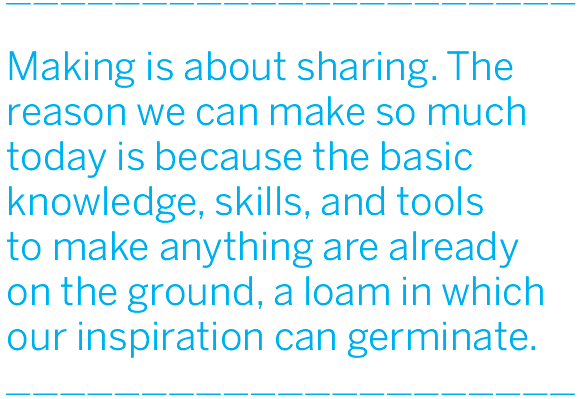
When I was a grub, we traded in forbidden knowledge: “If you unscrew the receiver on a pay phone and short the screws on the back of the speaker by touching them to the chrome on the side of the phone, you get an open dial tone.”
Or: “Here is how you fold an origami crane.” Or: “Thus and so and thus and so, and now you’ve taken the motor out of your old tape recorder and attached it to your Meccano set.” Or: “If you POKE this address on your Commodore PET, you’ll shut the machine down.” The knowledge diffused slowly, and each newly discovered crumb was an excitement and cause for celebration.
Today, as a nearly senescent 39-year-old, I look back on that period with a kind of wonder and dismay. I knew ten interesting things I could do with the gadgets, devices, and materials around me, and I thought myself rich. I knew that the Whole Earth Catalog, the Amok catalog, Paladin Press, and other purveyors of big secrets could send me dozens of new interesting things in mere weeks.
Thinking on my collection of hacks in those dim, pre-internet days, I’m reminded of the book fanciers of the Middle Ages who might, in a lifetimes, amass five or ten books and think themselves well-read.
Because, of course, today I have millions of hacks and tips and tricks and ideas at my fingertips, thanks to the internet and the tools that run on top of it. When I invent or discover something, I immediately put it on the net. And when I find myself in a corner of the world that is not to my liking, I Google up some hack that someone else has put on the net and apply it or adapt it to my needs.
Making, in short, is not about making. Making is about sharing. The reason we can make so much today is because the basic knowledge, skills, and tools to make anything and do anything are already on the ground, forming a loam in which our inspiration can germinate.
Consider the iPad for a moment. It’s true that Apple’s iTunes Store has inspired hundreds of thousands of apps, but every one of those apps is contingent on Apple’s approval. If you want to make something for the iPad, you pay $99 to join the Developer Program, make it, then send it to Apple and pray. If Apple smiles on you, you can send your hack to the world. If Apple frowns on you, you cannot.
What’s more, Apple uses code signing to restrict which apps can run on the iPad (and iPhone): if your app isn’t blessed by Apple, iPads will refuse to run it. Not that it’s technically challenging to defeat this code signing, but doing so is illegal, thanks to the 1998 Digital Millennium Copyright Act, which makes it a crime to circumvent a copyright-protection technology. So the only app store — or free repository — that can legally exist for Apple’s devices is the one that Apple runs for itself.
Some people say the iPad is a new kind of device: an appliance instead of a computer. But because Apple chose to add a thin veneer of DRM to the iPad, the Digital Millennium Copyright Act applies here, something that’s not true of any “appliance” you’ve ever seen. It’s as if Apple built a toaster that you can only use Apple’s bread in (or face a lawsuit), or a dishwasher that will only load Apple’s plates.
Apple fans will tell you that this doesn’t matter. Hackers can simply hack their iPads or shell out $99 to get the developer license. But without a means of distributing (and receiving) hacks from all parties, we’re back in the forbidden-knowledge Dark Ages — the poverty-stricken era in which a mere handful of ideas was counted as a fortune.
Cory Doctorow’s latest novel is Makers (Tor Books U.S., HarperVoyager U.K.). He lives in London and co-edits the website Boing Boing.
This column first appeared in MAKE Volume 23 (July 2010), on page 16.
From the pages of MAKE Volume 23:
MAKE Volume 23, Gadgets
This special issue is devoted to machines that do delightful and surprising things. In it, we show you how to make a miniature electronic Whac-a-Mole arcade game, a tiny but mighty see-through audio amp, a magic mirror that contains an animated soothsayer, a self-balancing one-wheeled Gyrocar, and the Most Useless Machine (as seen on The Colbert Report!). Plus we go behind the scenes and show you how Intellectual Ventures made their incredible laser targeting mosquito zapper — yes, it’s real, and you wish you had one for your patio barbecue. All this and much, much more.
ADVERTISEMENT
Making is about sharing. The reason we can make so much today is because the basic knowledge, skills, and tools to make anything are already on the ground, a loam in which our inspiration can germinate.
ADVERTISEMENT









